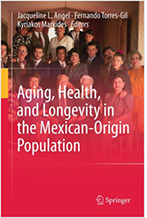Book
Aging, Health, and Longevity in the Mexican-Origin Population

As the nation's largest Latino group, the Mexican-origin population will play a major role as America grows older: their situation is vital to understanding our aging, diverse society as national health care policy comes into a new era of analysis and revision.
Aging, Health, and Longevity in the Mexican Origin Population identifies current and emerging health issues affecting this demographic, from health care disparities to changing family dynamics to the health implications of the United States' relationship with Mexico. Contributors test the Hispanic Paradox—that Latinos live longer than other Americans despite socioeconomic stresses—as it relates to various aspects of aging. Disability is discussed in social context, in terms of acculturation, family coping measures, access to care, and other key factors. And concluding chapters offer strategies for bringing the Mexican-American elder experience into the ongoing debate over health care. Throughout, coverage balances the heterogeneity of the community with its status as emblematic of minority aging and as a microcosm of aging in general. Included among the topics:
Immigration, economics, and family: contextualizing disability.
Diabetes and employment productivity.
The "healthy immigrant effect" and cognitive aging.
Nursing home care: separate and unequal.
Challenges of aging in place.
Estimating the demand for long-term care.
Aging, Health, and Longevity in the Mexican Origin Population brings issues, answers and a clear direction to those studying and working with this dynamic group, including policymakers, social workers, gerontologists, the academic and research communities, and health care professionals.

